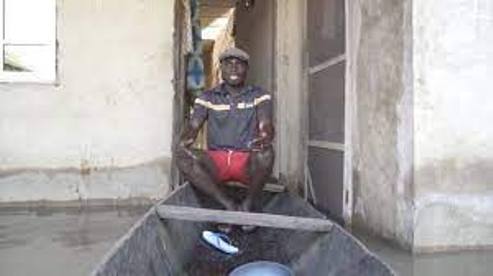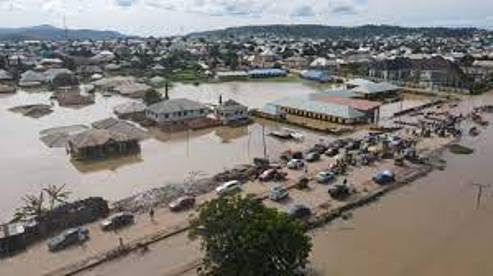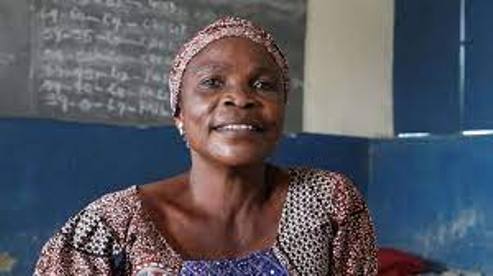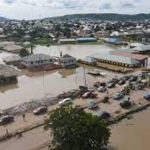Nigeria Floods: Even When The Flood Subsides, We Have Nowhere To Go, Victims Lament
LAGOS OCTOBER 31ST (NEWSRANGERS)-By the time Ifeanyin Ashley returned home from work, floodwaters had swept through his bungalow which housed his wife, children, and parents in Ogbaru, in Nigeria’s south-eastern Anambra state, leaving his armchairs soaked and his bed covered in mud.
Because the water had nearly reached knee level, he had to raise his belongings out of harm’s way. Now, the only things still in their usual place are two photo frames hung on the wall.
“I have to stay here,” Mr Ashley says as he sits in the canoe he has been using to get into his home. “If I leave, thieves may loot my house, or it becomes a breeding ground for reptiles. We cannot also go to the farm.”
Some of his neighbours are taking refuge at the community town hall, some in hospital lobbies, or churches as their homes have been totally submerged.
Elsewhere in Kogi, one of the worst-hit states, Habeebat Lawal’s house was inundated before it collapsed, and she could not save her belongings as she fled to shelter in a primary school.
“Even when the flood subsides, we don’t have anywhere to go,” she says. “No food, no money to buy cement, zinc, no money to rent a new house.”
Some Nigerian states, especially coastal ones where water flows into the River Niger – Africa’s third-longest river and by far the most important in West Africa – and the Benue River, are no strangers to such problems.
But this year’s deluge in Nigeria is among the worst the country has ever seen.
A decade ago, the worst flooding in more than 40 years in Nigeria claimed 431 lives and forced nearly two million people to leave their homes. This year’s devastation has seen even more deaths.
More than 600 lives have been lost, with thousands injured and about 1.3 million displaced, according to the country’s ministry of humanitarian affairs. Hundreds of thousands of houses as well as vast tracts of farmland have also been destroyed.
The unprecedented damage has been attributed to numerous factors.
These include poor drainage systems in many residential areas, with the channels often clogged with waste.
This is not helped by lax enforcement of environmental laws. Indiscriminate construction on natural floodplains and storm-water paths exacerbate the problem.
When heavy rains fall, it gets even worse.
This year’s rain has been unprecedented and “well above the flood situation in 2012,” says Water Resources Minister Suleiman Adamu.
“At Lokoja, the confluence of Rivers Niger and Benue, in 2012 the gauge reading was about 12.84 metres but as of October it has reached 13.22 metres,” he said.
According to Nigeria’s meteorological organisation, this year is set to be Nigeria’s wettest in 40 years. Experts say climate change is partly to blame for this year’s intense rainfall, with 31 out of the country’s 36 states affected, with more rain expected before the dry season starts in late November.
There is also untrammelled urbanisation which has damaged urban forests and wetlands.
Ordinarily trees should help soak up water and make the environment more habitable, but Nigeria’s forest cover has shrunk over the years.
In 2010, Nigeria had 10.9 million hectares of natural forest, or over 12% of its land area. By 2021, it had lost 96,500 hectares of that forest cover.
As Africa’s biggest economy grappled with the devastation, neighbouring Cameroon opened its Lagdo Dam, to ease the water pressure on its side of the border along the Benue River.
To serve as a buffer, Nigeria was supposed to complete the Dasin Hausa dam, but that is not finished despite promises made decades ago.
Had it, it would be two-and-a-half times the capacity of the Lagdo dam, generate 300MW of electricity and irrigate about 150,000 hectares of farmland across three states.
As well as these benefits, dams can protect against flooding as they can help control the river flow.
Mr Adamu blamed the delay in construction on negligence by past federal and state governments but notes that some deals have been signed to build more dams.
However, he said the Lagdo release is only a minor factor in this year’s flooding.
Presidential spokesperson Garba Shehu says President Buhari has ordered ministers to develop a flood action-plan within 90 days. But that is too late for this year.
Authorities have been shipping and airlifting relief materials to victims, but there are some who are yet to receive any aid.
Jiga Barnabas is one of them. He can only count his losses as he looks over his 14 hectares of rice farm buried under the floodwaters in Benue, another affected state.
He spent over one million naira (£2,000; $2,300) on land lease, herbicide, tractor rent, labour, seedlings, and weeding.
“Some of us borrowed money to cultivate these [farmlands]. The money is down the drain. We don’t know what to do””, Source: Jiga Barnabas, Source description: A Benue farmer who lost 14 hectares to flood, Image:
“It is unimaginable. This is my farm alone. I am not talking about other farms that are also submerged here.”
He was hoping to harvest around 140 50kg bags of rice which would have earned him around four times as much as he had invested.
“Some of us borrowed money to cultivate [these farmlands]. The money is down the drain. We don’t know what to do,” he says.
He also asks for improved security around farming zones as “it’s difficult to practise dry-season farming here”.
This is due to the stand-off that often occurs when grazing herders encroach onto farmlands as they travel south for grazing in the Middle Belt zone that straddles Nigeria’s semi-arid north and humid south.
“From February [till the rain starts], we can’t access the farms due to attacks from grazing herders,” he says.
Like Mrs Lawal in Kogi, Mr Barnabas also has nowhere else to go.
But in the past, when the floodwaters subsided, residents often returned to the sodden homes – a cycle that continues every year.
With climate change expected to lead to even more rainfall in Nigeria, residents will be hoping that the authorities finally take action to protect them from the annual floods.
BBC NEWS
Short URL: https://newsrangers.com/?p=95382









































